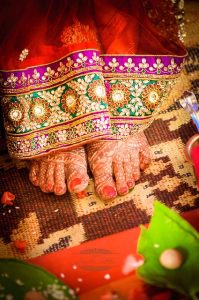By Arshia Malik
It is a very crucial time for Indian Muslims, especially the women. The fight that they have entrenched themselves in for abolishing the triple talaq, the talaq halala and polygamy, all regressive practices in Islam with no Quranic sanction, just got bigger with the larger reform recommendation of the Uniform Civil Code (UCC) projected under the slogan One Nation, One Law taken up by political parties.
The Women’s Movement of India spearheading this revolutionary change is doing all it can to end the choke hold of the mullah-politicians playing their appeasement politics for decades in order to keep the masses ignorant. India was partitioned in 1947 along religious lines into Pakistan and East Pakistan (later Bangladesh, in 1971) with no less connivance of the Imperialist British. Since then the Indian Muslims have had it rough and the rise of the Hindu Right was a huge impediment to their already fragile bond with the state.
The dynastic politics post partition of the Indian National Congress was a detriment to the progress of the Indian Muslims with their vote bank politics in upholding the legitimacy of the mullahs and regressive community leaders hell bent on keeping the lot in the 7th century. Not anymore. The rise of the Hindu Right exposed the chinks in this sort of approach and the Indian Muslim women seized the opportunity to give voice to the thousands of brutalised and traumatised women who have been victims of the regressive politics and the patriarchy of the Indian mullahs.
Dr Zeenat Shaukat Ali, founder, director general of The World Institute of Islamic Studies for Dialogue, Organisation of Mediation and Gender Justice (Wisdom Foundation), and a known international scholar on the subject of Islam and high status granted to Islamic Women in the Quran, currently one of the initiators for abolishing the ”triple talaq”, has been repeatedly appearing on Indian national television and writing in news outlets and social networking sites.
She recently congratulated the Indian Women’s Movement on their first victory that the Supreme Court of India ruled in their favour — that the women could be allowed to enter the inner sanctum of the Haji Ali dargah (revered shrine) in Mumbai (Bombay). Previously allowed 150 years ago but due to the spread of the Wahhabist nature of Islam in the subcontinent, this discriminatory practice had gained ground and was spreading to other holy and revered shrines in the land of the Sufis where Islam enjoyed a syncretic tradition since the days of Akbar the great, a Mughal ruler.
Zakia Soman, founder member of Bharatiya Muslim Mahila Andolan, a mass organisation of Muslim women in India, has also been at the forefront in the struggle for getting the ”triple talaq” banned in India. In her latest interview with Vaishna Roy of The Hindu, India’s leading newspapers, she says:
Believe me, on triple talaq too we will win. We will win not only because of the courts but because 50 to 60 per cent of the Muslim community supports us. They call us, mail us, tell us ‘we are with you’. They send us quotes from the Koran to support our views. I am inundated with mail
Vaishna Roy points out that for women to wrest the Muslim pulpit is radical indeed. But Soman and BMMA have managed to do just that. Their latest victory came when the Supreme Court allowed women to enter the sanctum of Mumbai’s famous Haji Ali shrine. Zakia Soman speaks with the confidence of a leader and an idea whose time has come. A confidence bolstered by the countless men who now support BMMA.
Surprisingly, the most sane judgment came from India’s only Muslim-majority state Jammu & Kashmir, which to this day continues to subvert the two-nation theory by resisting the proxy war of Pakistan, that it has been engaging in since 1947 to usurp the Indian territory. In the case of a certain Bilqees who filed a claim of maintenance for herself and her daughter in 2006 after the marriage failed, Justice Masoodi of the State High Court ruled that under the Kashmir Shariat Act 2007, Muslims are to be governed by the Shariat law and added that the primary sources of law are the Quran and Sunnat.
In his 2013 book, Religion, Law and Society across the Globe, Tahir Mahmood, India’s top legal academic and former chair of various National Commissions describing the case writes:
In the light of the exposition of the true Islamic law of marriage and divorce the judge concluded that ”a husband to wriggle out of his obligations under marriage, including one to maintain his wife, claiming to have divorced her, has not merely to prove that he has pronounced talaq or executed a divorce deed but has to compulsorily plead and prove that he has complied with the conditions and procedure laid down for talaq in the Quran and Sunnah.The learned judge then went on to dismiss the man’s appeal, as he had failed to provide evidence of all this and directed the lower court to her the case again and pending the final decision, award interim maintenance to the wife.
This landmark case is precisely what the women are fighting for on the Indian subcontinent. Whatever the outcome of the decision in the Indian courts vis a vis the victims of triple talaq, and talaq halala, the Indian women are going all out against this decades-long patriarchal mullah unity to keep billions of Indian Muslims under their regressive yokes.
The Indian Muslim women have woken up and they will win!
Update: India has now criminalised triple talaq for Muslim men.
Follow her on Twitter.


